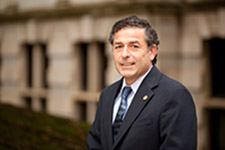U of A Research Team Invents Electrical Power Converter for Renewable Energy

A high-frequency matric converter invented by researchers at the University of Arkansas accepts power from a variety of renewable energy sources, including solar, and converts it for use in the electrical grid system.
FAYETTEVILLE, Ark. – Engineering researchers at the University of Arkansas have invented a novel electrical power converter system that simultaneously accepts power from a variety of energy sources and converts it for use in the electrical grid system.
Doctoral student Joseph Carr developed the system with his adviser, Juan Balda, University Professor and head of the department of electrical engineering.
Innovations in this field are critical as the United States moves toward integration of renewable energy sources to the national power grid.
The U.S. Department of Energy pursued and was granted a U.S. patent for the technology and is now seeking licensing opportunities for potential commercialization. The research was sponsored by a Department of Energy grant.
“It is very gratifying when doctoral students who invest many hours working on various research ideas are rewarded with a patent,” Balda said. “At the same time, it is an indication of research work that several faculty members and their students are doing in the field of future energy systems.”
The availability and use of renewable energy sources, such as solar, geothermal and wind, and their associated harvesting systems increase the need for new power converters that can efficiently convert diverse energy sources to work across modern electrical grid systems. Current renewable energy conversion systems are bulky, inefficient and struggle to accept multiple inputs from diverse sources.
The researchers’ high-frequency matrix converter addresses these shortcomings. Its simplified control system uses power converters to allow connection of a variety of power sources to a small, high-frequency transformer. Then, using a high-frequency matrix converter, it produces stable electricity ready to be supplied to the electrical grid system.
Carr received his doctorate from the university in 2011. He was a Distinguished Doctoral Fellow from 2005 to 2009 and co-authored nine articles published in journals and presented at international conferences. He now works for ABB, a power company in Raleigh, North Carolina.
 |
|
Juan Balda, University of Arkansas. |
Balda has been a professor at the university since 1989. His main research interests are power electronics, electric power distribution systems, motor drives and electric power quality. He is a senior member of the IEEE and member of the Power Electronics and Industry Applications Societies.
As associate director of the National Center for Reliable Electric Power Transmission, a 7,000-square-foot, $5-million power electronic test facility at the University of Arkansas, Balda is at the center of a critical corps of U of A researchers investigating solid-state solutions for the nation’s electric power grid.
About the University of Arkansas: The University of Arkansas provides an internationally competitive education for undergraduate and graduate students in more than 200 academic programs. The university contributes new knowledge, economic development, basic and applied research, and creative activity while also providing service to academic and professional disciplines. The Carnegie Foundation classifies the University of Arkansas among only 2 percent of universities in America that have the highest level of research activity. U.S. News & World Report ranks the University of Arkansas among its top American public research universities. Founded in 1871, the University of Arkansas comprises 10 colleges and schools and maintains a low student-to-faculty ratio that promotes personal attention and close mentoring.
Topics
Contacts
Juan Balda, University Professor, electrical engineering
College of Engineering
479-575-6578,
jbalda@uark.edu
Matt McGowan, science and research communications officer
University Relations
479-575-4246,
dmcgowa@uark.edu
Headlines
U of A Bands to Hold Three Nights of Concerts
The Symphonic Band, the Wind Symphony, the 4 O'Clock and 5 O'Clock Bands and the Wind Ensemble will perform April 21-23 at the Faulkner Performing Arts Center on the U of A campus.
Honors College to Host 'Best in Show' Dog Celebration
The campus and community are invited to celebrate our furry friends with popsicles, water and dog treats from 3-4 p.m. Thursday, April 25, in the Gearhart Courtyard.
New Parasite Affecting Canadian Partridges Named for Arkansas Poultry Scientist
A long-time colleague in Canada gave a newly found parasite the scientific name Eimeria hargisi in honor of U of A poultry science researcher Billy Hargis.
U of A School of Law Student Selected for Ms. J.D. Leadership Academy Intensive
Tristan Branstetter-Thomas, a second-year law student, was one of 30 students from across the country chosen to participate in the leadership academy at the Northwestern Pritzker School of Law in Chicago.
Needy Honored as Distinguished Alumna of University of Pittsburgh Engineering College
College of Engineering Dean Kim Needy was among seven alumni of the University of Pittsburgh Swanson School of Engineering honored in April as part of the 2024 Class of Distinguished Alumni.




